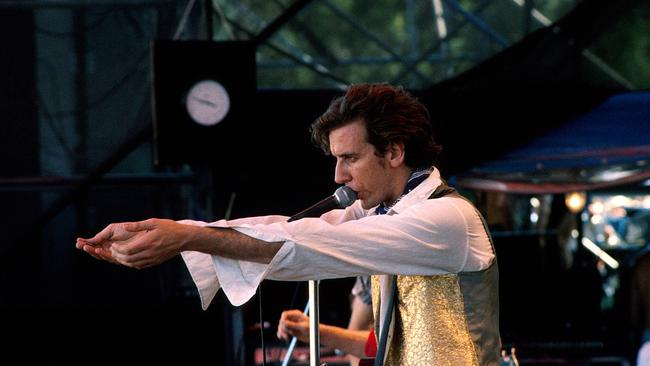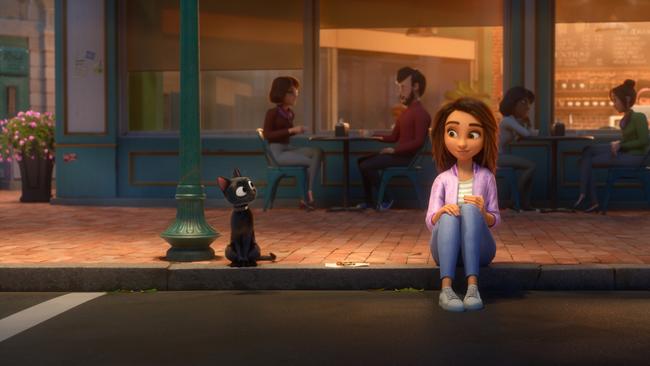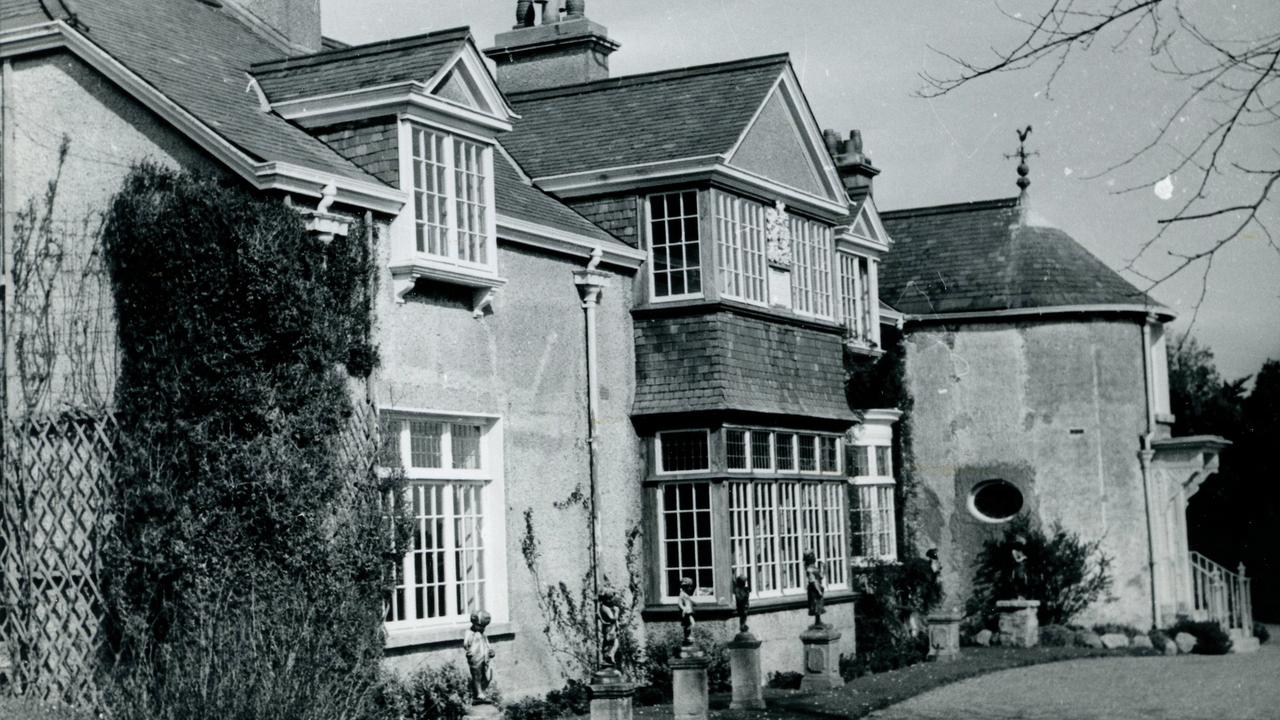Review, Love in Bright Landscapes: The Story of David McComb of The Triffids
The Triffids’ frontman David McComb died just shy of his 37th birthday. Everyone, with the possible exception of his father, agrees he was a tortured genius.

Love in Bright Landscapes (M)
Various streaming services. Details: www.loveinbrightlandscapes.com
★★★★
The fact I’m more familiar with the 1951 John Wyndham novel The Day of the Triffids than the 1980s Australian rock band that pinched its name says something about the gaps in my musical knowledge.
That particular gap was narrowed this week when I watched Love in Bright Landscapes: The Story of David McComb of The Triffids, a captivating documentary written and directed by Jonathan Alley.
As the subtitle suggests, this 100-minute movie centres on singer-songwriter David McComb, the handsome, driven, melancholic frontman of the band formed in Perth in 1978.
As fans will know, McComb died in 1999, just shy of his 37th birthday. He had cardiac problems – he received a heart transplant in 1995 – but alcohol and heroin also contributed to his poor health.
In Alley’s hands, this account of McComb’s brief, enigmatic life is a cry from an artist’s heart and a cry for the importance and endurance of art.
His former bandmates remember him, as do other musicians and music writers in Australia and Europe where The Triffids toured. Paul Kelly is insightful as usual.
It features interviews with McComb’s friends and family, including his now-deceased parents Harold and Athel, who were a cosmetic surgeon and geneticist respectively. Everyone, with the possible exception of his father, agrees he was a tortured genius.
The adjective counts there. This film, the directorial debut of Melbourne-based Alley, a long-time radio broadcaster and music journalist, is not a hagiography.
No one denies the brilliance of McComb’s mind and art but the cost to himself, and to others, was high.
Friend and bandmate Will Akers uses Marlene Dietrich’s line about Orson Welles to describe the stimulation of being in the same room as McComb. You “feel like a plant that’s been watered”.
Another friend and bandmate, Mark Peters, adds, “If Dave got an idea that he was going to do something, you’re not going to get in the way of that. He’s going to do it even if he’s going to bring the whole world down with him.”
McComb’s girlfriend, Joanne Alach, speaking after the passage of some time, is candid about his “martyr complex”. It was “convenient” for him to say she was the strong one and he was “weak and bad”. Within the band, McComb described himself as “the brains and irresponsibility’’.
There is footage of McComb’s media interviews. His letters home, and his poetry, are read by Booker Prize winner DBC Pierre, who is a fan.
The film title is drawn from a Triffids anthology album. Alley uses family home movies and photographs to tell McComb’s off-stage story. The snapshot of him, heart transplant scar showing, standing with his mother, each smiling, is quite beautiful.
“I knew from when he was born that he was different from the others,’’ his mother says. She was right about that. His father’s response to the idea of a music career was, “You’ll never be The Beatles, so what’s the point?”
That misses the point that not every band has to be The Beatles, and that even The Beatles had to start somewhere. Jackson Pollock said something similar about Picasso, but that didn’t stop him from painting.
McComb was a singular voice and he had an artistic vision. Alley has captured that superbly.
I was reminded of Nick Cave writing to MTV to ask that he not be considered for awards. “I have always been of the opinion that my music is unique and individual and exists beyond the realms inhabited by those who would reduce things to mere measuring. I am in competition with no one.” Listening to The Triffids’ songs interspersed through this movie I did think of Cave, who was in Europe at the same time as McComb. They have similar voices, see themselves as writers and share an interest in American southern gothic writers such as Flannery O’Connor.
“The area he cared about most,’’ a friend says, “was the written word. He was a writer from the moment he woke up till he fell asleep or passed out.”
This is an absorbing documentary about an Australian artist who died before he should have. When his poetry was published by Fremantle Press in 2009, the title was taken from one of the songs he wrote: Beautiful Waste.
Wasted, perhaps, but not forgotten. After watching this movie, and liking the music a lot, I downloaded Triffids albums and McComb’s solo album Love of Will.
As is noted in the end credits, “David’s music continues to tumble into new ears, hearts, and minds everywhere”.
-
Luck (G)
Apple TV+
★★★
The entertaining animated comedy Luck is a G-rated version of Michael Schur’s profound and hilarious 2016-20 television series The Good Place.
The main setting is the Land of Luck, a place in another dimension that manufactures luck for the human world. It’s run by a dragon named Babe (voiced by Jane Fonda) and the security chief is a leprechaun known as The Captain (Whoopi Goldberg).
Security is needed because in the bowels of this perfect place is a separate division that makes bad luck. This, like the Bad Place in Schur’s show, is the banishment destination for anyone who messes up.
The set up is quite clever. Adult viewers will nod their heads on seeing the various divisions of this luck-manufacturing enterprise. Right Parking Spot (Good Luck); Smell It But Can’t Find It, a department of the Dog Poop Research Centre (Bad Luck).
This Good Luck/Bad Luck world is tilted on its axis by an unexpected human visitor, Sam (actor and singer Eva Noblezada), who considers herself the unluckiest person on Earth.
She has fair reason to do so. An orphan, she has lived in children’s homes all her life. Now, having turned 18, she has to make it on her own.
She meets a talking black cat outside a diner, shares a sandwich with him and luck – whether bad or good only time will tell – sees her zapped into the dimension he comes from.
This cat, Bob, says he’s Scottish. He’s voiced by English actor Simon Pegg and one of the funnier moments comes when the security chief questions his nationality.
The plot is Sam and a reluctant Bob on a mission to steal some good luck and take it back to Sam’s young friend Hazel, another parentless child hoping for a “forever family”.
This 106-minute movie is directed by Peggy Holmes (The Little Mermaid: Ariel’s Beginning) and written by Kiel Murray (Cars). The head of animation, John Lasseter, is ex-Pixar and Disney.
It’s aimed at younger viewers and includes messages about the importance of sharing and being able to put others first.
Older viewers may enjoy the meeting between Babe the dragon and a scene-stealing German unicorn named Jeff (German actor Flula Borg). Babe and Jeff were lovers a century ago. When he recalls their passion, smoke puffs from Jane Fonda’s dragon nostrils.
And while Oscar winners Fonda and Goldberg are big names, in the animated sphere there’s a bigger one and it’s no surprise when the star of Toy Story, Finding Nemo and Monsters Inc turns up.
It’s John Ratzenberger, who viewers of a certain age will know as the postman Cliff in the Boston bar room sitcom Cheers. In a nice touch he is Rootie, a plant root who runs a tropical fruit juice bar in the bad luck zone.
This lighthearted movie asks if good luck can only exist alongside bad luck.
Would life be less interesting, for example, if a dropped piece of buttered toast always fell right side up?




